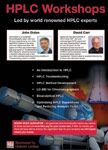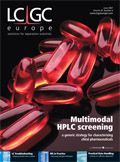HPLC Workshops
June–July 2007
June–July 2007
HPLC Workshops
Reading and Manchester, UK
A series of one-day workshops, sponsored by Hichrom Limited, will take place at the Madejski Stadium in Reading and the Copthorne Hotel in Manchester.

The courses are being led by David Carr who has been involved in high performance liquid chromatography (HPLC) since 1971.
An acknowledged HPLC expert, David Carr has developed several courses for understanding the basic principles of HPLC and the important aspects of reversed-phase method development.
- An Introduction to HPLC – 26 June 2007, Reading
This short one-day course introduces scientists to the basic concepts and operational principles of high performance liquid chromatography, with an emphasis on reversed-phase HPLC. No previous HPLC training is assumed.
- HPLC Method Development – 27 June 2007, Reading
Reversed-phase method development is looked upon as a mystery by many chromatographers. This course guides chromatographers through each step of the pathway that leads to achieving good resolution. The course will be
especially valuable to those with some chromatography experience who are either unfamiliar with method development or wish to improve their existing strategies.
- Bioanalysis by HPLC – 3 July 2007, Manchester
This course is designed for scientists involved in the pharmaceutical field, especially those involved with the analysis or characterisation of protein herapeutic drugs. No previous experience of HPLC is necessary.
- Optimising HPLC Separations – 4 July 2007, Manchester
This course is designed to assist chromatographers in reducing analysis costs and increasing laboratory throughput by developing faster, more reproducible HPLC assays in a time effective manner. Much of the course will appeal to the more experienced chromatographer intending to improve existing methods or developing new methods.
A training brochure with further details on all of these courses and others is available. For your copy or for more information on any of the above
seminars please contact Peggy Lloyd on tel: 0118 930 3660, fax: 0118 932 3484 or e-mail: seminars@hichrom.co.uk
June 2007
HPLC 2007
Ghent, Belgium
HPLC 2007, the premier meeting for liquid phase separations and related
techniques, will take place from 17–21 June in the International Convention Centre, Ghent, Belgium.
Ghent has all the assets of a Metropolis in a cosy university town located in the heart of Flanders, Belgium.
The programme will include plenary and keynote lectures, prominently featured poster presentations, an exhibition displaying the latest instrumental innovations in separation science and related subjects and a highly attractive social programme offering opportunities to meet with world renowned scientists.
For more information contact Mrs Myrjam Panis, exhibition manager, UDIAS vzw
Z. 1 Research Park, B-1731 ZELLIK, Belgium, tel: +32 2 4810050 or e-mail: m.panis@udias.be or visit http://www.hplc2007.org
16–18 July 2007
Analytical Research Forum 2007, University of Strathclyde, Glasgow, Scotland, G1 1XL UK
Contact: Ruth Needham, RSC Conferences, Thomas Graham House, Science Park, Milton Road, Cambridge, CB4 0WF, UK
tel: +44 (0)1223 432380
fax: +44 (0)1223 423623
e-mail: conferences@rsc.org
26–29 August 2007
4th Nordic Separation Science Society International Conference Kaunas, Lithuania
Contact: Audrius MaruÖ³ka, Conference Chairman, Vytautas Magnus University, Vileikos st 8, LT-44404 Kaunas, Lithuania
tel: +37 03 732 7907
fax: +37 03 732 7908
e-mail: a.maruska@gmf.vdu.lt
website: http://conference.vdu.lt/nosss4
17–21 September 2007
Modern Pharmaceutical Solids Cracow, Poland
Contact: Marek Zakrzewki, Analytics, Aleksandrowska 24/13, Lodz, 91–120 Poland
tel: +48 42 496 69 56
fax: +48 42 651 48 83
e-mail: ania@analytics-pharm.com
23–26 September 2007
12th International Meeting on Recent Developments in Pharmaceutical Analysis Hotel Hermitage, Island of Elba, Italy
Contact: Prof. Sandra Furlanetto, RDPA 2007 Secretariat, Dept Pharm Sci, Univ Florence, 50019 Sesto Fiorentino FI, Italy
tel: +39-055-4573717
fax: +39-055-4573779
e-mail: secretariat@rdpa2007.com
15–16 October 2007
18th Annual International Light Scattering Colloquium
The Four Seasons Biltmore Hotel , Santa Barbara, California, USA
For more information visit:
http://www.wyatt.com/events/colloquium/
Send your event details to cbuckett@advanstar.com
Regulatory Deadlines and Supply Chain Challenges Take Center Stage in Nitrosamine Discussion
April 10th 2025During an LCGC International peer exchange, Aloka Srinivasan, Mayank Bhanti, and Amber Burch discussed the regulatory deadlines and supply chain challenges that come with nitrosamine analysis.
Polysorbate Quantification and Degradation Analysis via LC and Charged Aerosol Detection
April 9th 2025Scientists from ThermoFisher Scientific published a review article in the Journal of Chromatography A that provided an overview of HPLC analysis using charged aerosol detection can help with polysorbate quantification.














